Biden To Discuss Iran's Nuclear Issue In Call With Putin
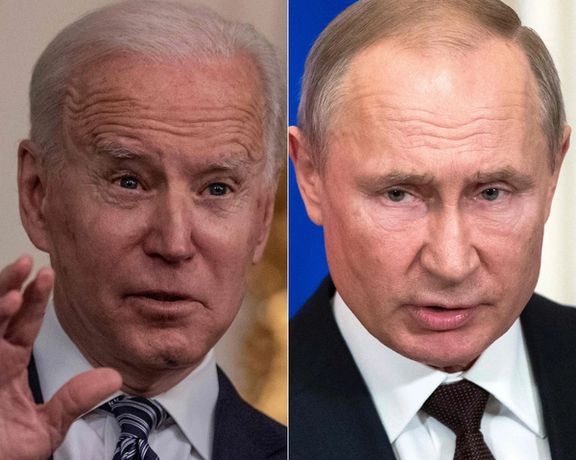
President Joe Biden will raise the issue of Iran’s nuclear program in his call with Russian President Vladimir Putin on Tuesday, the White House told reporters on Monday.

President Joe Biden will raise the issue of Iran’s nuclear program in his call with Russian President Vladimir Putin on Tuesday, the White House told reporters on Monday.
In a briefing about the crisis surrounding a Russian military buildup around Ukraine and Biden’s decision to discuss it directly with Putin, the official said, “The agenda will also cover a number of other critical issues including strategic stability, cyber, and Iran’s nuclear program.”
Talks between Iran and world powers in Vienna last week aimed at reviving the 2015 nuclear deal (JCPOA) ended without results on Friday at the dismay of the United States and its three European allies, the United Kingdom, France and Germany that are participants of the agreement. The US pulled out of the agreement in 2018 prompting Iran to expand its nuclear program.
Iran has ramped up its uranium enrichment this year, stockpiling 20 and 60-percent enriched uranium and getting closer to have enough fissile material for a bomb.
The official reiterated US concerns that Iran’s advances in its nuclear program will be discussed as a major international concern during the Biden-Putin call.
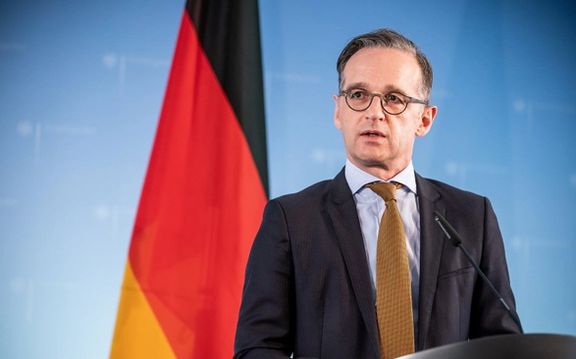
Germany said Monday that it did not regard Iranian proposals to revive Tehran’s 2015 nuclear deal with world powers as “a basis for a successful end to talks.”
Iran last week circulated in Vienna to world powers written texts on ways to restore the JCPOA (Joint Comprehensive Plan of Action), which was abandoned by the United States in 2018.
"We reviewed the proposals...carefully and thoroughly and concluded that Iran violated almost all compromises found previously in months of hard negotiations," the German spokeswoman told reporters.
The Vienna talks were suspended in June, as Iran decided for a break saying it needed to form a government after its presidential election, but later delayed rejoining the talks. At the time some participants claimed agreement was 70-80 percent done. The formal process in Vienna involves remaining JCPOA signatories – China, France, Germany, Iran, Russia, and the United Kingdom – with a US delegation led by White House envoy Rob Malley taking part indirectly.
Iran’s lead negotiator Ali Bagheri Kani has said Iran expects further talks on its basis of its draft proposals, which require lifting US ‘maximum pressure’ sanctions levied since the US left the JCPOA, before Iran reciprocates. Bagheri Kani said this would clear the way for Iran to scale back steps taken extending its nuclear program since 2019.
The German foreign ministry spokeswoman said it was unacceptable for Iran to continue such nuclear activities while talks continued, and that while Berlin remained "committed to the diplomatic path…the window of opportunity is closing more and more."
It was not clear whether the German reaction to the Iranian proposals reflected a common position of the ‘E3,’ the three western European JCPOA powers, who have generally coordinated their approach.
A senior Iranian official said Sunday that a US reluctance to lift sanctions imposed on Iran since 2018 was the main challenge in reviving the JCPOA. The previous administration of Donald Trump imposed sanctions over ‘human rights’ or, as in the case of then Iranian foreign minister Mohammad Javad Zarif, links to the office of Iranian leader Ali Khamenei.
‘Heads-up’ and Plan Bs
With JCPOA opponents in the US demanding a ‘plan B,’ Secretary of State Antony Blinken said Friday that the US would pursue other options over Iran diplomacy failed. In a call for military action Monday, Benjamin Netanyahu, former Israeli prime minister and JCPOA critic, tweeted that Israel should “act independently against Iran’s nuclear program…without any ‘heads-up’…”
Iranian foreign minister Hossein Amir-Abdollahian said Monday Iran had no ‘plan B’ to pursue “simultaneously as we negotiate.” He spoke after meeting with Syrian Foreign Minister Faisal Mekdad in Tehran.
Iran has said it expects talks in Vienna to resume once details are agreed with Enrique Mora, the EU official chairing the talks. Amir-Abdollahian flatly rejected claims, attributed by Axios to a “US source” with supposed knowledge of an Israeli intelligence briefing, that Iran “could take that dramatic step soon” of enriching uranium to 90 percent “in an attempt to gain leverage in the Vienna talks.”
Under the JCPOA, Iran enriched to 3.67 percent, but increased to 20 percent February and subsequently to 60 percent after attacks on its nuclear facilities widely attributed to Israel.
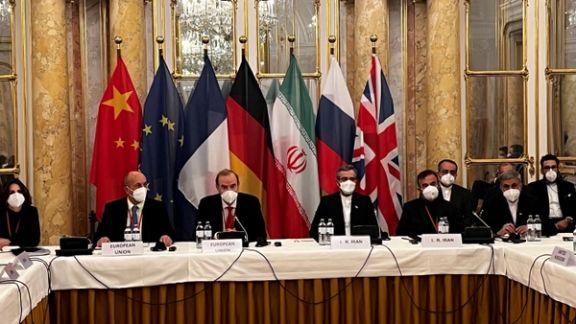
Iran reiterated Monday that it would negotiate in Vienna only on the basis of its drafts sent to world powers, demanding first the removal of all sanctions.
Resumed nuclear talks last week ended on Friday without any success, prompting the United States and its European allies to express dismay. One official told reporters that Iran reneged on previous compromises and presented new demands.
“We are negotiating in Vienna on the basis of the [three] draft documents we have put forward on the lifting of sanctions and how to stop Iran’s remedial measures [expanding nuclear activities in response],” spokesman Saeed Khatibzadeh told reporters at his weekly press briefing Monday. Documents submitted to other parties, he explained, were based on the text of the JCPOA and on the previous six rounds of talks in Vienna, held before President Ebrahim Raisi (Raeesi) took office.
“There is basically no talk of anything as a step-by-step deal or interim plans,” Khatibzadeh added, referring to Iran's demands that post-2018 sanctions should be removed all at once.
Iran’s lead negotiator Ali Bagheri Kani in an interview broadcast by al-Jazeera television Saturday said that “any sanctions in violation and not consistent with the JCPOA should be removed immediately.” This included “all the sanctions imposed or re-imposed under the so-called ‘maximum pressure’ campaign of the US,” and that Iran would in turn return its nuclear program to the limits of the JCPOA, the Joint Comprehensive Plan of Action.
Raisi briefly referred to the nuclear issue in a televised talk Sunday, saying he was pursuing the "lifting of sanctions" based on proposals Iran had made to world powers.
One of the two main documents includes Iran's analysis of relevant sanctions while the second lists the steps Iran would take in return in scaling back aspects of the nuclear program it began expanding in 2019 after the US left the JCPOA in 2018 and imposed ‘maximum pressure’ sanction.
Khatibzadeh suggested that western media had been spreading pessimism about the Vienna talks and advised Iranian media not to "copy-paste" western media in order to score domestic political points. "Don't become hostile media's domestic megaphones," he warned.
Deadlock over sanctions?
The spokesman said the onus lay now with other parties to the talks – formally the remaining signatories of the JCPOA China, France, Germany, Russia and the United Kingdom; indirectly the US – to respond to the Iranian proposals. "Other aspects [of renewing the 2015 agreement] in the draft proposal can't be discussed before Iran is assured it can benefit from the lifting of sanctions,” he said.
In an interview with Italy's ANSA Sunday, Bagheri Kani insisted that Iran would not "backtrack on its demands" if the JCPOA is to be revived. He said that while Iran’s commitments over nuclear restrictions were clear, there had been “deadlock about many of the sanctions that the other side must lift.”
Since the United States left the JCPOA in 2018, it has imposed a variety of sanctions on Tehran, crucially threatening third parties with punitive action for buying Iran’s oil or dealing with its financial sectors. Officials in the previous administration of President Donald Trump made clear their intention – even with supposedly ‘non-nuclear’ sanctions − of thwarting any subsequent attempts to revive the JCPOA.
Khatibzadeh said Iranian negotiators would stay in Vienna "as long as required” and remained committed to "strike a good deal.” He said talk would resume later this week after a scheduled phone call between Bagheri Kani and Enrique Mora, the European Union official chairing the talks.
Responding to a question on whether Iran's missile defense program and its accession to the Financial Action Task Force (FATF), the international money-laundering watchdog, were being discussed in Vienna, Khatibzadeh said Iran will not make commitments other than those related to its nuclear program.
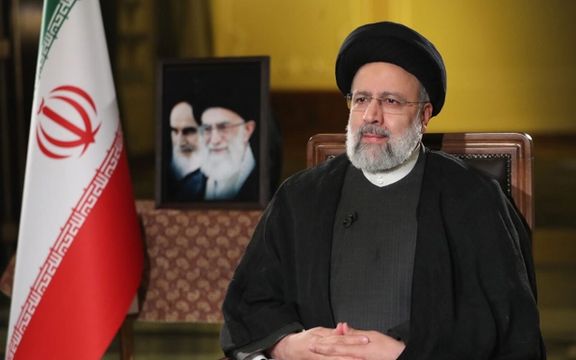
In a televised talk Sunday, Iran’s President Ebrahim Raisi only briefly addressed Iran's nuclear issue saying he is keenly pursuing the "lifting of sanctions".
Raisi said Western countries thought his government would not continue the nuclear talks and "had nothing [worthy] to say" but "it has now been proven that we [did]. We presented a text [in the new round of talks] and the matter is being pursued," he said.
In the one-hour program, Raisi spoke about the nuclear issue for less than 2 minutes.
The first round of talks after Raisi took office was held from November 29-December 3 and ended without any progress. The United States and European allies voiced dismay and pessimism, saying Iran reneged on all compromises made during earlier rounds oftalks in Vienna.
He added that his government "does not tie the country's budget and economy" to the issue of nuclear talks and is working towards the "lifting of US sanctions" while making every effort to "neutralize [the impact of] sanctions" through establishment of a special taskforce for the purpose.
The interview announced a day earlier was on the occasion of the first 100 days of his presidency, although that was 20 days ago.
The interviewer referred to Iran's full membership in the Shanghai Cooperation Organization(SCO) in September as one of Raisi's foreign policy "achievements" and Raisi himself said he has been very active in foreign policy matters with an emphasis on relations with neighboring and regional countries and held "over 100 meetings and phone calls" with leaders of other countries since taking office.
Biggest achievement
When asked how he himself rated his administration's performance, he spoke about the accelerated pace of Covid-19 vaccination in the past 4 months and blamed the Rouhani government for the slow progress until August. Raisi claimed credit for “over 100 million doses of Covid vaccines" administered in four months, which he said made it possible to reopen “over 100,000 businesses".
Asked why vaccines were not readily available before he took office despite purchase orders having been placed during his predecessor, he said he had contacted officials of other countries personally, ordered the government to provide the cash needed for buying vaccines and supported domestic vaccine developers.
Iran’s vaccination effort until August was slow compared to other countries because Supreme Leader Ali Khamenei banned the purchase of American and British vaccines for political reasons at a time when they were the main products available.
Soon after taking office, in a phone call with the Chinese President Xi Jinping, Raisi urged China to deliver Covid vaccines to Iran urgently. Chinese vaccines make up most of vaccines imported.
The state-controlled TV's interviewer described the government's performance in healthcare including vaccination as "brilliant". Critics of the government have alleged that Raisi's administration has been taking credit for vaccines procured by the previous government.
Critics have said the Islamic Republic officials have lied and bluffed their way during the pandemic.
The riddle of the economy
Regarding the economic crisis people face, Raisi said when he took office reserves of basic commodities were troublingly low but his administration has managed to procure basic foodstuff such as wheat to bring the reserves to an acceptable level.
Raisi said his government is monthly paying 10,000 billion rials ($230 million) on average for purchases made by the previous government. He claimed that his government has succeeded in making all necessary payments without borrowing from the central bank which would cause higher inflation. He said inflation has come under control and the rate of its growth is decreasing.
Iran’s former central bank chairman Abdolnasser Hemmati tweeted Sunday that the government is essentially printing money, since all banks in Iran are affiliated with the state and when the government borrows money from them, the central bank has to print more money.
The president’s critics from all factions say that he has done little in his first months to address multiple crises facing the country, the most important of which is a nuclear agreement to pave the way for lifting of US sanctions. He has been warned that without removing the crippling restrictions, there could be no solution to the huge budget deficit, high inflation and the rapidly falling standards of living.

Israeli Prime Minister Naftali Bennett on Sunday urged world powers to take a hard line against Iran in nuclear talks held in Vienna earlier in the week.
Bennet is dispatching his top defense and intelligence officials to Washington to discuss the flailing talks.
“I call on every country negotiating with Iran in Vienna to take a strong line and make it clear to Iran that they cannot enrich uranium and negotiate at the same time,” Bennett told a meeting of his Cabinet.
“Iran must begin to pay a price for its violations.”
Buoyed by the failure of negotiators to make any breakthrough in the Vienna talks, chief of Israel’s Mossad and its defense minister visit Washington this week to urge the Biden Administration not to make concessions to Iran.
Prominent voices in Israel are now indicating the US withdrawal, especially without a contingency plan for Iran's continuously developing nuclear plan, was a blunder.
But Israel’s new government has maintained a similar position as former Prime Minister Benjamin Netanyahu, rejecting a return to the original deal and calling for diplomacy to be accompanied by military pressure on Iran.
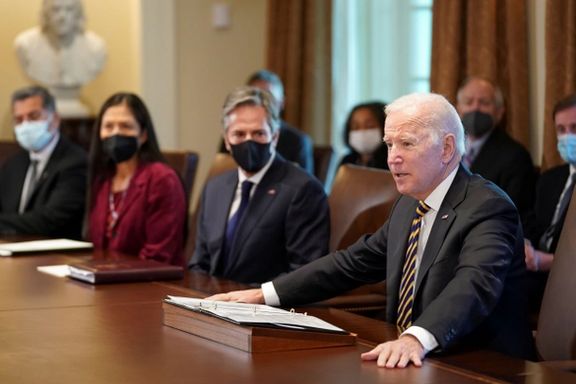
With the disappointing end to the Iran nuclear talks on Friday, Israel is engaged in new efforts to dissuade Washington from offering any concessions to Tehran.
Israeli Prime Minister Naftali Bennett urged world powers to take a hard line against Iran in negotiations aimed at reviving 2015 nuclear agreement, as his top defense and intelligence officials headed to Washington to discuss the flailing talks.
Israeli officials believe that the US did not expect Iran to come to Vienna with an uncompromising posture and they think the pause in the talks offers a chance for them to put pressure on the Biden Administration to reconsider its approach toward Iran, Haaretz reported.
Haaretz reported that Israeli officials repeated a warning over the weekend that the United States might still be interested in offering sanctions relief to Tehran in exchange for a partial deal.
Mossad chief David Barnea travels to Washington on Sunday to discuss the Iran nuclear negotiations, after the three European signatories of the Iran nuclear deal (JCPOA) and the US voiced disappointment at the seventh round of talks with Iran in Vienna.
Israel opposed the original deal, arguing that it would not stop Iran to produce nuclear weapons as its limitation are due to mostly end by 2030. Israel also backed former president Donald Trump’s decision to withdraw from the JCPOA in 2018 and pursue ‘maximum pressure’ sanctions.
With the Biden Administration seemingly eager to restore the agreement, Israel and others believe the outcome would be even worse than the previous deal, without expanding its limitation.
Iran’s new hardline government appears not to be in the mood for any concessions, reneging even on compromises it had made in the first six round of talks from April to June.
Haaretz said that Barnea will try to persuade the Biden Administration to avoid an interim or partial deal if it does not ensure Iran’s return to full compliance with the JCPOA limitations. The most important cap the agreement put on Iran’s nuclear program was its limit on uranium enrichment.
Iran began breaking those limits in 2019 as retaliation against US sanctions and accelerated enrichment even further in early 2021 just as the new US administration announced its readiness to engage in talks to revive the agreement.
On Sunday when the Israeli deputy defense minister Alon Schuster was asked about a loud explosion Saturday night near Iran’s key nuclear site, he said “can’t say” what hit Natanz. He added that Israel is currently trying to bring about a change in the motivations of the whole world through diplomatic means.”
“We have a duty to be brave and responsible for the fate of our children and grandchildren,” he said. “We have used force against our enemies in the past and we are convinced that in extreme situations, there is a need to act using military means.”
Haaretz also said that Barnea’s meetings in Washington will be “extremely significant”. He will tell the Americans that Israel will not consider itself bound by any agreement with Iran. Earlier, Israeli officials had said that if a deal does not permanently block Iran’s path to nuclear weapons, it has to act based on its national security requirements.
Israeli defense minister Benny Gantz will also visit Washington later in the week, with talks expected to focus on Iran.